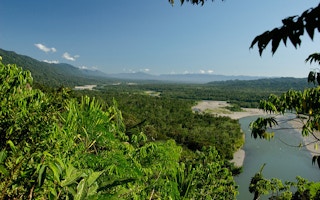World Bank loans to Peru threaten to fuel destruction of the Amazon rainforest and drive climate change by financing new gas pipelines, despite a bank commitment to use its development funds to help cut global warming, campaigners said on Friday in a report the Washington-based lender disputed as inaccurate and lacking context.
About $2.5 billion in World Bank investments in Peru are subsidising 26 new oil and gas concessions and other energy infrastructure, said the Bank Information Center, a U.S.-based advocacy group (BIC).
The investments in Peru are part of a broader $15 billion dollar fund - about a third of the World Bank’s total investments - known as Development Policy Financing (DPF), aimed at helping countries cut poverty.
The Bank’s Climate Action Plan “identifies DPF operations as the main instrument for incentivizing countries to transition to low-carbon economies,” BIC noted in a statement.
Climate scientists say that to meet globally agreed targets to limit climate change most energy sources developed now and in the future must be renewable and many fossil fuel reserves must remain untapped.
“
The World Bank has pledged to help countries adopt a low-carbon development path specifically by phasing out fossil fuel subsidies. However, the Bank’s lending policy does the opposite.
Nezir Sinani, Bank Information Center
Peru is home to the world’s forth largest tropical rainforest and preserving these trees constitutes 70 per cent of the South American nation’s international climate change commitments.
Campaigners say World Bank-backed fossil fuel investments in the Amazon will pollute the rainforest, hurt indigenous land rights and contribute to climate change rather than help curb it.
“The World Bank has pledged to help countries adopt a low-carbon development path specifically by phasing out fossil fuel subsidies,” Nezir Sinani from the Bank Information Center said in a statement.
“However, the Bank’s lending policy does the opposite.”
The World Bank disputed those statements, saying its lending was designed to spurn economic growth in Peru through public-private partnerships along with environmental protection.
“The Bank has supported Peru’s effort to mitigate and manage the impacts of climate change and natural disasters through a range of instruments,” the lender said in a statement.
Local authorities decided natural gas pipelines and other large infrastructure projects in the Amazon were good investments, the World Bank said.
Development Policy Financing has been an effective source of funding to help countries combat climate change and improve resilience, by investing in infrastructure, human capital and effective regulations, the World Bank said.
The World Bank said it helped Peru create its Ministry of Environment and Natural Resource Management as part of its work in improving governance in the nation of 30 million.
The Bank said its investments in rural Andean regions are boosting resilience to climate change by improving road access, and that it is working with indigenous communities in the Amazon to improve forest conservation.
But campaigners are urging the World Bank to stop supporting fossil fuel extraction and exploration in the Amazon in order to limit climate change and protect the world’s largest rainforest as a bulkwark against the global problem.
The Asian Development Bank already excludes oil and gas exploration from its loan portfolio campaigners said, urging the World Bank to do the same.
Peru’s government did not immediately comment on the report.
This story was published with permission from Thomson Reuters Foundation, the charitable arm of Thomson Reuters, that covers humanitarian news, women’s rights, trafficking, property rights, climate change and resilience. Visit http://news.trust.org










